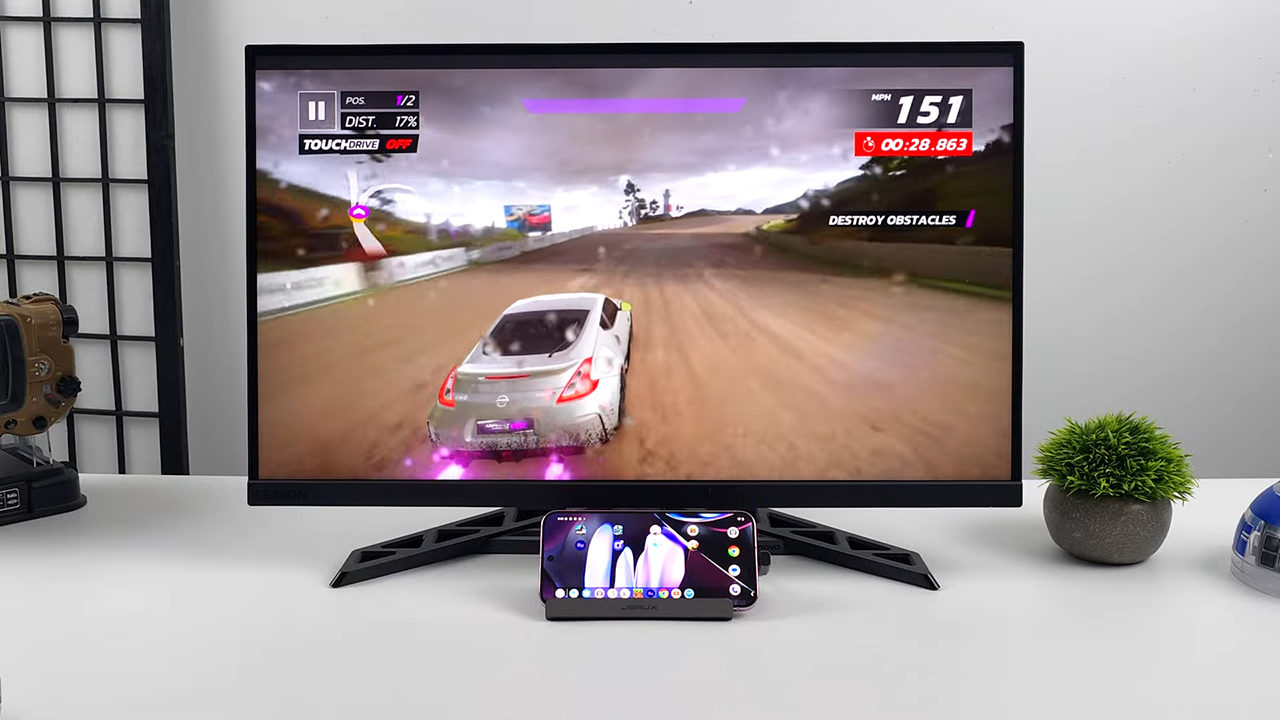 Mobile Tutorial
Mobile Tutorial Mobile News
Mobile News Google Pixel 9 series phones natively support USB-C display output, and Android 15 will welcome enhanced desktop mode
Google Pixel 9 series phones natively support USB-C display output, and Android 15 will welcome enhanced desktop modeAccording to news on August 22, Google introduced USB-C display output support to the Pixel 8 series earlier this year through the Android 14 QPR3 Beta 2 update. The feature, which was rolled out widely in a June feature update, allows users to mirror their phone's screen to an external display. However, there were some issues with the functionality at the time.

According to AndroidAuthority, Google has improved this feature on the Pixel 9 series:
- Native support for USB-C display output: No need for dedicated This feature is available in hardware.
-
Connection method:
- Connect Pixel 9 to an external display using a USB-C hub with an HDMI port.
- If the monitor supports USB-C input, you can use a USB-C to USB-C cable to connect directly.
- Mirror function: After connection, a "Mirror to external display?" pop-up window will appear on the phone. Select the "Mirror Display" button to immediately mirror the phone screen to the monitor.
- Applicable models: Pixel 9, Pixel 9 Pro and Pixel 9 Pro XL all support this feature.
Enhanced for Android 15
Currently, USB-C display output only supports screen mirroring. However, Android 15 may enhance the feature:
- Enhanced Desktop Mode: Google is working on an enhanced desktop mode, and USB-C display output support is a key feature for its proper functioning.
The above is the detailed content of Google Pixel 9 series phones natively support USB-C display output, and Android 15 will welcome enhanced desktop mode. For more information, please follow other related articles on the PHP Chinese website!
 谷歌 Pixel 9 系列手机原生支持 USB-C 显示输出,Android 15 将迎增强的桌面模式Aug 22, 2024 pm 01:56 PM
谷歌 Pixel 9 系列手机原生支持 USB-C 显示输出,Android 15 将迎增强的桌面模式Aug 22, 2024 pm 01:56 PM8月22日消息,谷歌在今年早些时候通过Android14QPR3Beta2更新为Pixel8系列引入了USB-C显示输出支持。这一功能在6月功能更新中广泛推出,允许用户将手机屏幕镜像到外部显示器上。然而,当时的功能存在一些问题。Pixel9系列的USB-C显示输出功能据AndroidAuthority报道,谷歌在Pixel9系列上对这一功能进行了改进:原生支持USB-C显示输出:无需专用硬件即可使用此功能。连接方式:使用带有HDMI端口的USB-C集线器连接Pixel9到外部显示器。如果显示器支
 Google Pixel 9 and Pixel 9 Pro rumoured to gain Creative Assistant AI upon releaseJun 22, 2024 am 10:50 AM
Google Pixel 9 and Pixel 9 Pro rumoured to gain Creative Assistant AI upon releaseJun 22, 2024 am 10:50 AMCurrently, four new Pixel smartphones are anticipated to land this autumn. To recap, the series is rumoured to feature thePixel 9 and Pixel 9 Pro at launch. However, the Pixel 9 Pro will be a rival to the iPhone 16 Pro rather than a Pixel 8 Pro (curr
 Google Pixel 9 smartphones will not launch with Android 15 despite seven-year update commitmentAug 01, 2024 pm 02:56 PM
Google Pixel 9 smartphones will not launch with Android 15 despite seven-year update commitmentAug 01, 2024 pm 02:56 PMThe Pixel 9 series is almost here, having been scheduled for an August 13 release. Based on recent rumours, the Pixel 9, Pixel 9 Pro and Pixel 9 Pro XL will mirror the Pixel 8 and Pixel 8 Pro (curr. $749 on Amazon) by starting with 128 GB of storage.
 Google Pixel 9 Pro XL gets tested with desktop modeAug 29, 2024 pm 01:09 PM
Google Pixel 9 Pro XL gets tested with desktop modeAug 29, 2024 pm 01:09 PMGoogle has introduced DisplayPort Alternate Mode with the Pixel 8 series, and it's present on the newly launched Pixel 9 lineup. While it's mainly there to let you mirror the smartphone display with a connected screen, you can also use it for desktop
 谷歌 Pixel 9 系列手机本地 AI 功能曝光:文生图、自动生成回复建议等Apr 18, 2024 pm 12:10 PM
谷歌 Pixel 9 系列手机本地 AI 功能曝光:文生图、自动生成回复建议等Apr 18, 2024 pm 12:10 PM4月18日消息,消息源AssembleDebug近日挖掘谷歌AICore等应用程序,在代码中发现了关于谷歌Pixel9系列手机将引入的诸多本地AI功能,包括OCR、TEXT_TO_IMAGE、QUESTION_TO_ANSWER等。其中最值得关注的一项就是TEXT_TO_IMAGE功能,表明Pixel9系列手机不依赖云服务器,可以在本地运行AI模型,基于用户输入的文本内容,自动生成相关的图片。此外关于OCR,应该表明Pixel9系列通过调用本地AI模型,进一步提高识别图片中文本的功能。另一个值得
 Leaked Google Pixel 9 adverts show new AI features including \'Add Me\' camera functionalityJul 30, 2024 am 11:18 AM
Leaked Google Pixel 9 adverts show new AI features including \'Add Me\' camera functionalityJul 30, 2024 am 11:18 AMMore promotional materials relating to the Pixel 9 series have leaked online. For reference, the new leak arrived shortly after 91mobiles shared multiple images that also showcased the Pixel Buds Pro 2 and Pixel Watch 3 or Pixel Watch 3 XL. This time
 谷歌 Pixel 9 系列会有第三款机型,XL 版手机保护套曝光May 07, 2024 pm 12:55 PM
谷歌 Pixel 9 系列会有第三款机型,XL 版手机保护套曝光May 07, 2024 pm 12:55 PM感谢网友华南吴彦祖的线索投递!5月7日消息,科技媒体AndroidCentral近日发布报道,分享了谷歌Pixel9Pro和Pixel9XL两款手机的保护套照片,再次确认谷歌今年将会推出3款Pixel9系列手机:标准版、Pro版和XL版。注:谷歌在2019年左右一直使用XL后缀来命名其更大尺寸的Pixel手机,但在推出仅一款尺寸的Pixel5之后便取消了这一命名方式。2021年谷歌又将旗舰机型命名改为“Pro”,此后一直沿用至今。本次曝光的保护套再次表明谷歌将Pro系列细分为两种尺寸,重新启用X
 首次非最新版本,谷歌 Pixel 9 系列手机被曝预装安卓 14 系统Aug 01, 2024 pm 04:54 PM
首次非最新版本,谷歌 Pixel 9 系列手机被曝预装安卓 14 系统Aug 01, 2024 pm 04:54 PM8月1日消息,科技媒体AndroidHeadline昨日(7月31日)发布博文,从内部渠道确认谷歌Pixel9系列手机出厂将搭载安卓14系统。这在谷歌Pixel手机发布历史上是头一遭,通常情况下Pixel手机会搭载安卓最新版本,理论上Pixel9系列应该会预装安卓15系统。7月30日报道,谷歌发布了安卓15Beta4.1更新,更新规模较小,主要修复了Pixel设备通话时音频崩溃的问题。鉴于此次更新的规模较小,外界猜测安卓15正式版可能很快就会推出。谷歌通常情况下会在8-9月间发布安卓新版本:安卓


Hot AI Tools

Undresser.AI Undress
AI-powered app for creating realistic nude photos

AI Clothes Remover
Online AI tool for removing clothes from photos.

Undress AI Tool
Undress images for free

Clothoff.io
AI clothes remover

AI Hentai Generator
Generate AI Hentai for free.

Hot Article

Hot Tools

SAP NetWeaver Server Adapter for Eclipse
Integrate Eclipse with SAP NetWeaver application server.

EditPlus Chinese cracked version
Small size, syntax highlighting, does not support code prompt function

Dreamweaver Mac version
Visual web development tools

Notepad++7.3.1
Easy-to-use and free code editor

VSCode Windows 64-bit Download
A free and powerful IDE editor launched by Microsoft





